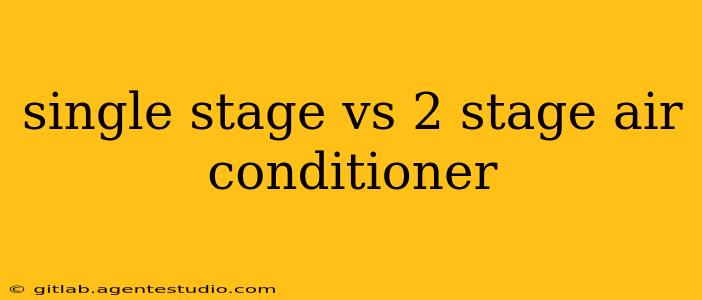Choosing the right air conditioner can significantly impact your comfort and energy bills. Two major types dominate the market: single-stage and two-stage air conditioners. Understanding their differences is crucial for making an informed decision. This comprehensive guide explores the key distinctions between single-stage and two-stage AC units, helping you determine which best suits your needs and budget.
Understanding Air Conditioner Stages
Before diving into the specifics, let's clarify what "stages" refer to in air conditioning. A stage represents the compressor's operational capacity. A single-stage unit operates at either 100% capacity or off—it's an on/off system. A two-stage unit, on the other hand, offers more nuanced control, operating at either 50% or 100% capacity.
Single-Stage Air Conditioners: The Basics
Single-stage air conditioners are the more traditional and generally less expensive option. They are simple, reliable, and readily available.
Advantages of Single-Stage AC Units:
- Lower Initial Cost: Single-stage units typically have a lower upfront purchase price.
- Simplicity: Their straightforward design translates to easier installation and maintenance.
- Wide Availability: Finding a qualified technician to install and service a single-stage system is generally easier.
Disadvantages of Single-Stage AC Units:
- Constant On/Off Cycling: This can lead to temperature fluctuations and less consistent comfort. The constant cycling also puts more stress on the system, potentially shortening its lifespan.
- Less Energy Efficient: The on/off cycling is less efficient than the modulated operation of a two-stage system. You may experience higher energy bills.
- Potential for Short Cycling: The system might turn on and off frequently, particularly during mild weather, reducing its efficiency even further.
Two-Stage Air Conditioners: Enhanced Comfort and Efficiency
Two-stage air conditioners provide a more sophisticated approach to climate control, offering improved comfort and energy savings.
Advantages of Two-Stage AC Units:
- Improved Comfort: The ability to operate at 50% capacity allows for more precise temperature regulation, minimizing temperature swings and maintaining a more consistent environment.
- Enhanced Energy Efficiency: By running at a lower capacity when needed, the system consumes less energy, leading to lower utility bills.
- Reduced Wear and Tear: The gentler operation reduces stress on the compressor and other components, potentially extending the system's lifespan.
- Better Humidity Control: The two-stage operation allows for better dehumidification, particularly beneficial in humid climates.
Disadvantages of Two-Stage AC Units:
- Higher Initial Cost: The more complex design and advanced features come with a higher purchase price.
- More Complex Installation: Installation might require a more skilled technician.
- Potentially Higher Repair Costs: Repairs could be more expensive due to the increased complexity of the system.
Choosing the Right System: Factors to Consider
The best choice between a single-stage and a two-stage air conditioner depends on several factors:
- Budget: Single-stage units are more budget-friendly upfront, while two-stage units offer long-term savings through increased efficiency.
- Climate: In consistently hot climates, a two-stage system’s efficiency and comfort benefits are more pronounced.
- Home Size and Insulation: Well-insulated homes may benefit more from a two-stage system's ability to fine-tune temperature control.
- Personal Preferences: If consistent temperature is a priority, a two-stage system might be preferable.
Conclusion: Making the Best Choice for Your Needs
Both single-stage and two-stage air conditioners have their strengths and weaknesses. Weighing the advantages and disadvantages against your specific needs, budget, and climate will lead you to the optimal choice for your home. Consulting with a qualified HVAC professional is always recommended to ensure you select the most suitable and efficient system for your circumstances. Remember, investing in a high-quality, well-maintained air conditioner pays dividends in comfort and long-term savings.

